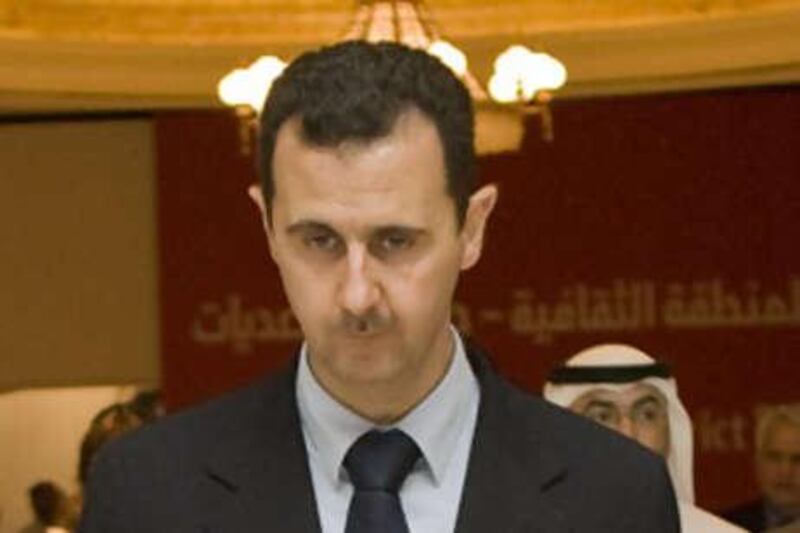DAMASCUS // When the Syrian president Bashar al Assad lands in Paris tomorrow, greeted by his French counterpart Nicolas Sarkozy, the message the Syrians hope to broadcast is that America's hardline, anti-regime policy has failed. From a near pariah state associated with assassination and tyranny, Syria is seizing on the visit to underscore its role in the Middle East and show that its diplomatic isolation from the West is officially over.
Mr Assad has called the trip to Paris "historic" for opening doors to France and Europe that had been firmly shut. After meeting with Mr Sarkozy tomorrow, the Syrian leader will take part in a summit marking the launch of the Mediterranean Union, which will gather some 40 European and Mediterranean leaders, and most significant perhaps, will mark the first time a Syrian president has sat at the same table as an Israeli delegation.
Syria and Israel, both countries with Mediterranean shorelines, have technically been at war since 1948. However, recent indirect talks mediated by Turkey have revived previously comatose prospects for a peace deal. The end of George W Bush's presidency next January is perhaps the crowning event. In an interview with the French daily Le Monde before the Paris talks, Mr Assad said Syria was prepared to offer concessions to the next US president.
"Frankly, we do not think that the current American administration is capable of making peace. It doesn't have either the will or the vision, and it only has a few months left," he said. Relations between Syria and France were suspended in February 2005 following the assassination of Rafiq Hariri, Lebanon's former prime minister and a personal friend of Jacques Chirac, the former French president. Damascus is accused of involvement in the murder, an allegation it denies.
Cut off from the French, branded a state sponsor of terrorism by the United States and facing criticism from America's regional allies over its support for Hizbollah in Lebanon, Syria was under diplomatic siege. The Syrians, in turn, clamped down on dissent and looked east for friends, concentrating on strengthening ties with Iran, Russia, China and India. "Everyone was trying to isolate Syria: the Americans, the West, the French," said Tharbit Salem, a political analyst based in Damascus.
"This visit to Paris is a sign that the siege has ended." Syrian commentators said the shift in French policy came with the realisation that attempts to weaken and marginalise Hizbollah, the Lebanese militia and political party backed by Damascus and Iran, had failed. Then came the Doha agreement, in which Hizbollah and the Lebanese government claimed satisfaction with the deal worked out in Qatar, as did the French, who insisted Syria had made concessions after months of playing a spoiling role. Saad Hariri - Rafiq Hariri's son and an ally to France - said the agreement had "deeply wounded" his father's political movement; Hizbollah, for its part, emerged politically stronger than ever, analysts say.
"Hizbollah's success in May [when Hizbollah fighters took control of large swathes of Beirut, brushing aside the Lebanese army and government security forces and pushing back rival militias] helped change the attitude of the French towards Syria," Mr Salem said. "The French had been betting on the wrong horse in Lebanon. They were with the government and Saad Hariri but that horse was weak, while Hizbollah's power and popularity was real."
According to Mr Salem, this French loss was decisive in prompting them to seek a rapprochement with Syria. "I know the French approached the Syrians about restarting their relationship," he said. "It was not a case of Syria going and asking the French. Syria sat and waited and the French came to them." France has old colonial ties with Syria and Lebanon, which make up its major sphere of influence in the Middle East. Hizbollah's ascendancy put that at risk.
"France realised that without engaging Syria, the French cannot really project any regional influence," he said. "They also know that Arab public opinion on Hizbollah on the war in Iraq is pretty firmly on the Syrian side." Another ongoing thorn in the side of Franco-Syrian relations has been the UN investigation into the murder of Rafik Hariri. "The Hariri tribunal was a serious, serious issue. It doesn't seem to be so serious these days. It has receded into the background more," Mr Salem said. "The truth is that America, France and Israel tried to defeat Hizbollah and failed. And the Syrians have succeeded in their policy. This visit is acknowledgement of that fact."
psands@thenational.ae





